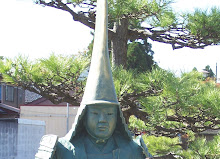Gregory Clark, vice president, Akita International University in Japan recently had some interesting thoughts on the failure of Japanese schools to properly teach English.
He mentions the fact that although Japanese children get about six years of English instruction in the public schools, they lag well behind countries like Korea, which do a better job of preparing their students.
The real problem - and Mr. Clark nails it - is that the people teaching English in Japanese high schools are Japanese teachers who can’t speak a lick of English. They might be able to diagram a sentence, but they can’t order a beer in New York City to save their life. Mr. Clark comments:
“Japan seems not to want to realize the harm caused by having young students spend six years listening to bad English. Some say that if the world is happy with Indian or Singapore English then it should accept Japanese English. But these other varieties of English are standarized and fluent. Listening to them is no harder (sometimes easier even) than listening to the accents and dialects of British English.”
He writes that Japanese English (Japlish):
“is a hodgepodge of accents and pronunciations thrown together and spoken haltingly. It is hard on both the ear and the patience. More importantly, most Japlish speakers find it very hard to process English spoken at normal speed. Normal conversation is almost impossible.”
He also believes that Japanese students aren’t as motivated as their Chinese and Korean peers, because English isn’t as necessary to get ahead in Japan.
Yet I think he is really onto something when he critiques the manner in which Japanese people understand knowledge and learning. The Japanese people have a long history, and they learn it exclusively as a list of dates and facts. Many Japanese people know when a certain Japanese battle happened in 1656, but they have no idea how it fits into the political, social and philosophical whole of Japanese culture and history.
Mr. Clark states:
“Language learning is not like math or history — the mere accumulation of facts and data. With language the memory operates at two levels. One is what I call conscious memorization — mastering enough of the grammar, vocabulary, etc., to be able to translate and put sentences together. But at some stage the language has to be moved to the subconscious and that can only happen with strong motivation and good learning techniques — repetition, realistic conversation, good listening materials and so on. Only at this subconscious level can you retain vocabulary and speak the language naturally.”
He believes that learning English should be moved to the university level; interesting idea, but then again you will run into the resort atmosphere of most Japanese universities, where everyone is taking a break from crazy Japanese school entrance exams .
Mr. Clark has a real understanding of the problems of English and learning in Japanese culture. Undoubtedly it will take much more than bureaucratic reforms to convince a rather isolated and coddled Japanese generation that real life require sacrifices, and that Japan’s wealth today has little to do with its future place in the world.
Mr. Clark’s complete article on Japan and English learning is well worth a read.








No comments:
Post a Comment